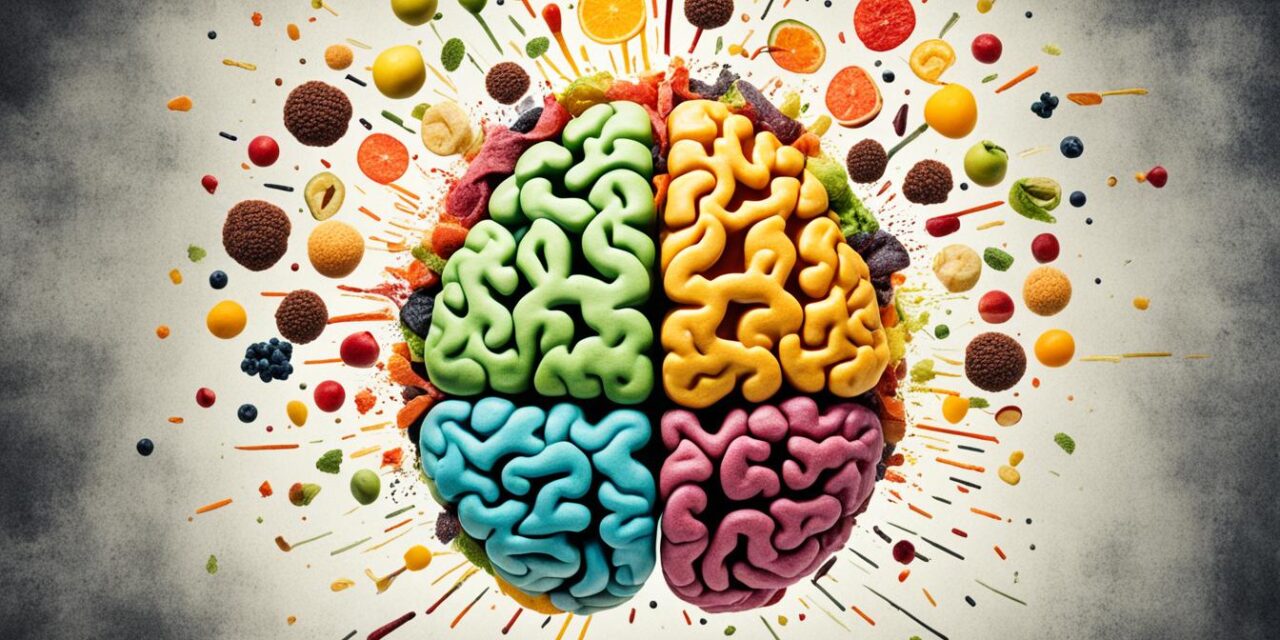Did you know that your diet can have a direct impact on your brain function? It’s true, what you eat can affect your focus, memory, and overall mental health. And when it comes to the effects of diet on the brain, the impact of junk food can be particularly significant.
Studies have shown that consuming high amounts of sugary drinks and refined carbs can increase the risk of type 2 diabetes, which in turn is linked to a higher risk of developing Alzheimer’s disease. Trans fats, commonly found in processed foods, can cause inflammation in the brain and increase the risk of cognitive problems, anxiety, and Alzheimer’s disease.
So, if you’ve ever wondered about the connection between what you eat and how your brain functions, this article is for you. Read on to discover the surprising ways in which your diet can impact your focus, memory, and mental well-being.
Key Takeaways:
- Your diet has a direct impact on your brain function.
- Consuming junk food, including sugary drinks and refined carbs, can increase the risk of cognitive problems and inflammation in the brain.
- Trans fats, commonly found in processed foods, can impair brain function and increase the risk of cognitive decline.
- Opting for a healthy diet rich in whole, fresh foods can support optimal brain function and protect against cognitive decline.
- Being mindful of what you eat is essential for better focus, memory, and mental health.
The Impact of Sugary Drinks on Brain Health
When it comes to brain health, what you drink matters just as much as what you eat. Unfortunately, sugary drinks like soda, sports drinks, energy drinks, and even fruit juice have been found to have a negative impact on your brain.
Did you know that high intake of sugary drinks can increase the risk of developing type 2 diabetes? And as you may know, diabetes has been linked to an increased risk of dementia. So, that innocent can of soda or refreshing bottle of fruit juice might not be so innocent after all.
“Sugary drinks have a direct impact on brain health, increasing the risk of cognitive decline and dementia.”
But what is it about these sugary drinks that makes them so harmful? One culprit is high-fructose corn syrup, a common sweetener used in many sugary beverages. This sneaky ingredient can wreak havoc on your brain and body.
Animal studies have shown that a high intake of fructose can lead to insulin resistance in the brain, impaired memory and learning, and reduced formation of brain neurons. In simpler terms, too much fructose from sugary drinks can lead to brain fog and hinder your ability to remember and learn new things.
In addition to the negative impact on brain function, sugary drinks can also increase the risk of obesity, high blood pressure, high blood fats, diabetes, and arterial dysfunction. These health problems further contribute to the risk of dementia and other cognitive issues.
To protect your brain health, it’s important to limit the consumption of sugary drinks. Instead, opt for healthier alternatives like water, herbal tea, or flavored water with no added sugars. Your brain will thank you!
| Sugary Drink | Sugar content (per serving) |
|---|---|
| Soda | 39 grams |
| Sports Drink | 21 grams |
| Energy Drink | 29 grams |
| Fruit Juice | 24 grams |
The Role of Refined Carbs in Cognitive Function
When it comes to your cognitive function, refined carbohydrates can wreak havoc on your brain. These carbs, found in sugars and highly processed grains, have a high glycemic index (GI) and glycemic load (GL), which means they cause a rapid spike in blood sugar and insulin levels.
But what does this mean for your brain? Well, it turns out that this rapid rise and fall in blood sugar can impair memory and cognitive function. Research has even shown that just a single meal with a high glycemic load can lead to memory impairment. So, that mid-afternoon doughnut might not be doing your brain any favors.
“Even a single meal with a high glycemic load can impair memory.”
Not only do refined carbs affect memory and cognitive function, but they can also cause inflammation in the brain, specifically in the hippocampus, which is a key area for memory. This inflammation can further contribute to memory impairment and potentially lead to long-term memory problems.
To support optimal brain function, it’s important to choose healthier, lower GI carbs. Incorporate more vegetables, fruits, legumes, and whole grains into your diet. These types of carbohydrates have a lower glycemic index and load, providing a slower and more stable release of energy to your brain.
Healthy Low GI Carbs to Include in Your Diet:
- Fresh fruits and vegetables
- Legumes, like beans and lentils
- Whole grains, such as quinoa, brown rice, and whole wheat bread
By opting for these healthier carb options, you can support your brain’s cognitive function and reduce the risk of memory impairment caused by refined carbs.
The Dangers of Foods High in Trans Fats
When it comes to brain health, trans fats are the enemy. These artificial fats, commonly found in popular food products like margarine, frostings, and packaged snacks, can have serious detrimental effects on your cognitive well-being. Consuming trans fats has been directly linked to an increased risk of cognitive problems, anxiety, and even Alzheimer’s disease. It’s time to take a closer look at the dangers these fats pose to your brain.
One of the primary concerns with trans fats is their ability to increase inflammation in the brain. This inflammation can have a direct impact on cognitive decline and overall brain function. Trans fats impair synaptic plasticity, which refers to the connections between neurons. These weakened connections can lead to a decline in cognitive abilities, making it harder to focus, remember, and process information.
Research has revealed that high intake of trans fats can activate microglia and astrocytes in the brain. These immune cells are responsible for maintaining brain health and protecting against damage. However, when they are activated in response to trans fats, they can cause inflammation in important brain areas such as the hippocampus and hypothalamus. This inflammation not only disrupts normal brain function but can also contribute to the development of cognitive disorders like Alzheimer’s disease.
It’s crucial to avoid trans fats in your diet for the sake of your brain health. Instead, opt for healthier fats that support optimal brain function. Omega-3 fatty acids, found in foods like fatty fish, walnuts, and flax seeds, have been shown to have numerous benefits for brain health. These healthy fats reduce inflammation, protect against cognitive decline, and support the overall well-being of your brain.
Incorporating omega-3-rich foods into your diet can be a simple and effective way to promote brain health. Try adding a serving of fatty fish like salmon or trout to your weekly meals. Sprinkle some walnuts on your salad or enjoy them as a snack. And don’t forget about the power of flax seeds, which can be easily added to smoothies, yogurt, or oatmeal.
By making these small dietary changes and eliminating trans fats from your meals, you can protect your brain from inflammation, cognitive decline, and the risks associated with Alzheimer’s disease. Your brain deserves the best, so choose foods that nourish and support its health.
| Food | Trans Fat Content (per serving) |
|---|---|
| Margarine (hard) | 2 grams |
| Pastry dough | 1.5 grams |
| Cookies | 0.5 grams |
| Packaged snack cakes | 0.3 grams |
Takeaway
Trans fats are a serious threat to your brain health. They can increase inflammation, impair synaptic plasticity, and contribute to cognitive decline and Alzheimer’s disease. By avoiding trans fats and incorporating omega-3-rich foods into your diet, you can protect your brain and support its optimal functioning.
The Negative Effects of Highly Processed Foods on the Brain
When it comes to brain health, highly processed foods are no friend to your cognitive function. These foods, typically loaded with sugar, added fats, and excessive salt, can wreak havoc on your brain’s well-being. Not only are highly processed foods nutritionally deficient, but they also pose several detrimental effects on your brain health.
Highly processed foods pack a calorie-dense punch without offering the essential nutrients your brain needs to thrive. Consuming these foods regularly can lead to oxidative stress in the brain, which, in turn, triggers the activation of microglia. This activation causes inflammation in critical areas of the brain like the hippocampus and hypothalamus. Why does this matter?
“Chronic inflammation in the brain can impair cognitive function, learning, and memory.”
Research has shown that chronic inflammation in the brain due to highly processed food consumption can result in impaired cognitive function, memory problems, and decreased learning abilities. So, if you find yourself struggling to concentrate or retain information, your diet may be playing a more significant role than you realize.
On the flip side, adopting a Mediterranean-style diet rich in whole, fresh foods has been found to protect against cognitive decline. By opting for fresh fruits, vegetables, nuts, seeds, lean meats, and fish, you nourish your brain with the essential nutrients it needs to function optimally. Not only does this promote brain health, but it also supports cognitive processes like synaptic plasticity, which is crucial for learning and memory.
The Role of Highly Processed Foods in Inflammation
Highly processed foods ignite a cascade of inflammatory processes within the brain. The excessive sugar, added fats, and artificial additives present in these foods trigger the release of pro-inflammatory molecules, leading to chronic inflammation. This sustained inflammation adversely affects synaptic plasticity, impairs neuronal communication, and hampers cognitive abilities.
The Connection Between Highly Processed Foods and Cognitive Decline
The negative impact of highly processed foods extends beyond short-term effects. Prolonged consumption of these inflammatory culprits can accelerate cognitive decline and increase the risk of neurodegenerative diseases like Alzheimer’s. The debilitating effects stem from the chronic inflammation that damages brain cells, disrupts neuronal connections, and compromises overall brain health.
| Effects of Highly Processed Foods on the Brain | Consequence |
|---|---|
| Chronic inflammation | Impaired cognitive function, memory problems, decreased learning abilities |
| Disrupted synaptic plasticity | Reduced ability to form new memories, impaired learning processes |
| Increased risk of neurodegenerative diseases | Cognitive decline, higher susceptibility to conditions like Alzheimer’s |
It’s clear that highly processed foods pose a significant threat to brain health. By prioritizing fresh, whole foods and avoiding processed alternatives, you can protect your cognitive abilities, promote brain health, and safeguard against the risk of cognitive decline.
Conclusion
So, here’s the bottom line: what you eat matters when it comes to your brain health, focus, memory, and mental well-being. Indulging in a diet filled with junk food, including sugary drinks, refined carbs, trans fats, and highly processed foods, can wreak havoc on your brain function. These choices increase the risk of cognitive problems, inflammation, and even mental health conditions like depression. It’s time to take charge of your brain and make better choices.
Instead, opt for a diet that nourishes your brain with whole, fresh foods. This can provide the support your brain needs for optimal function, improving cognitive abilities, and protecting against cognitive decline. Fuel your focus and memory with nutrient-dense options that promote overall brain health. It’s all about being mindful of what you eat and prioritizing your brain’s well-being.
Your brain deserves the best, so say goodbye to junk food and hello to a brain-boosting diet. Remember, every bite counts. Choose foods that enhance your mental clarity and vitality. Your focus, memory, and mental health will thank you for it.
FAQ
How does your diet affect focus and brain health?
What are the effects of sugary drinks on brain health?
How do refined carbs affect cognitive function?
What are the dangers of foods high in trans fats?
How do highly processed foods affect the brain?
How does diet affect brain health, focus, and memory?
MORE SOURCES TO READ:
- https://www.ncbi.nlm.nih.gov/pmc/articles/PMC2805706/
- https://www.healthline.com/nutrition/worst-foods-for-your-brain
- https://kids.frontiersin.org/articles/10.3389/frym.2021.578214
![]()














Recent Comments